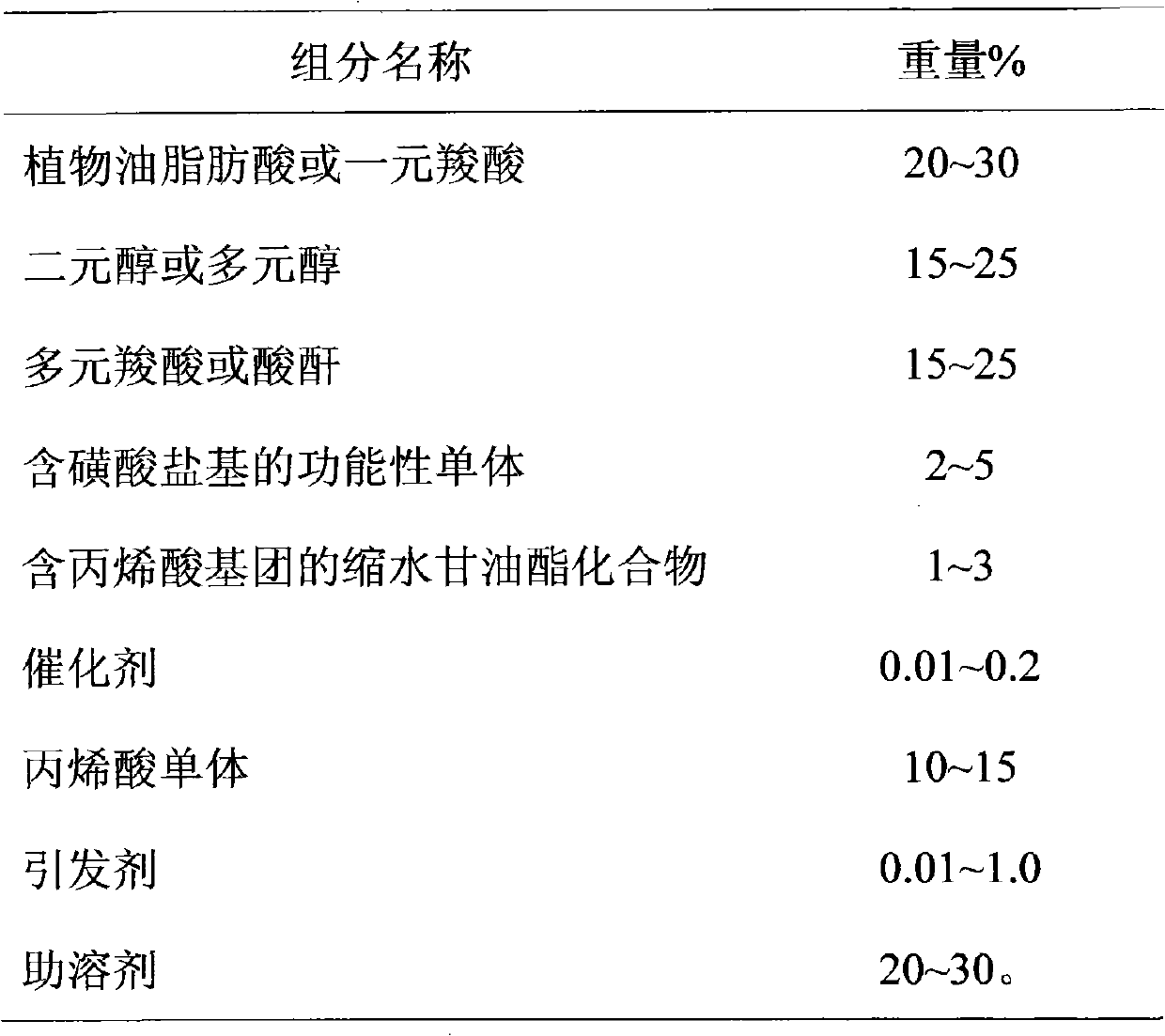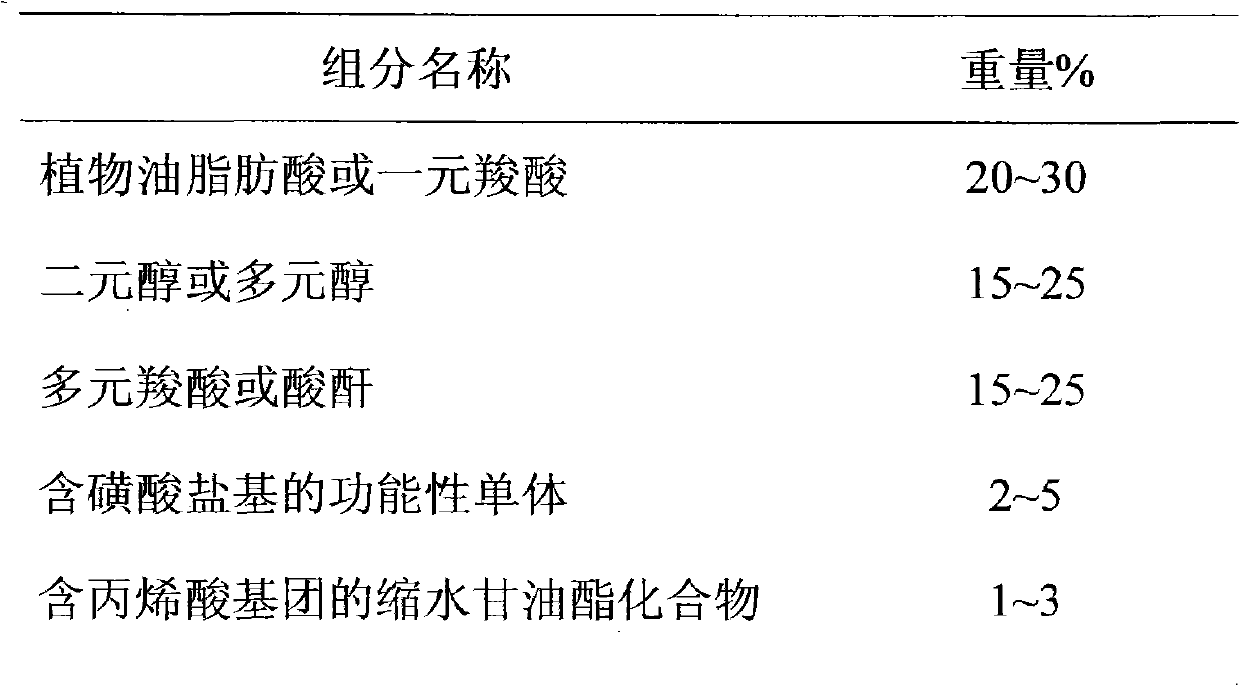Acrylic acid modified sulfonate-based water-reducible alkyd resins
A technology of alkyd resin and sulfonate, which is applied in the direction of coating, etc., can solve the problems of poor storage stability of acrylic modified water-based alkyd latex, difficulty in product quality control, low monomer conversion rate, etc., to improve storage stability and hydrolysis resistance, improved drying and weather resistance, and high solid content
- Summary
- Abstract
- Description
- Claims
- Application Information
AI Technical Summary
Problems solved by technology
Method used
Image
Examples
Embodiment 1
[0022]Add 250.2 g of trimethylolpropane, 97.2 g of isophthalic acid, 32.2 g of 5-sodiosulfonic acid-isophthalic acid and 0.8 g of butyltin triisooctanoate into a reaction flask, and pass nitrogen gas for 10 to 20 minutes. Start heating up. When the temperature rises to 110-120°C, the material melts and starts to stir. Continue to raise the temperature to 180-200°C, and keep the reaction at this temperature until the acid value is 30mgKOH / g, then lower the temperature. When the temperature drops to 180-190°C, add 211.5g of linoleic acid, 25.6g of benzoic acid, 97.2g of isophthalic acid and 0.4g of butyltin triisooctoate, continue to heat up to 200-220°C, and keep it at this temperature Carry out the reaction until the acid value is 50 mgKOH / g, then lower the temperature. When the temperature drops to 150-160°C, add 20g of glycidyl methacrylate, continue the reaction until the acid value is 35mgKOH / g, then add 220g of ethylene glycol butyl ether to dilute the resin to obtain s...
Embodiment 2
[0025] Add 239.4g of trimethylolpropane, 109.7g of terephthalic acid, 32.2g of 5-sodiosulfonic acid-isophthalic acid and 0.8g of butyltin triisooctoate into a reaction flask, and pass nitrogen gas for 10 to 20 minutes. Start heating up. When the temperature rises to 110-120°C, the material melts and starts to stir. Continue to raise the temperature to 180-200°C, and keep the reaction at this temperature until the acid value is 30mgKOH / g, then lower the temperature. When the temperature drops to 180-190°C, add 244.8g of dehydrated castor oil fatty acid, 109.7g of terephthalic acid and 0.4g of butyltin triisooctanoate, continue to heat up to 200-220°C, and keep the reaction at this temperature until After the acid value is 50mgKOH / g, the temperature is lowered. When the temperature drops to 150-160°C, add 20g of glycidyl methacrylate, continue the reaction until the acid value is 35mgKOH / g, then add 234g of ethylene glycol butyl ether to dilute the resin to obtain sulfonate-ba...
Embodiment 3
[0028] Add 189.2g of trimethylolpropane, 98.5g of isophthalic acid, 32.2g of 5-sodiosulfonic acid-isophthalic acid and 0.8g of butyltin triisooctanoate into a reaction flask, and pass nitrogen gas for 10 to 20 minutes. Start heating up. When the temperature rises to 110-120°C, the material melts and starts to stir. Continue to raise the temperature to 180-200°C, and keep the reaction at this temperature until the acid value is 30mgKOH / g, then lower the temperature. When the temperature drops to 180-190°C, add 211.5g of soy oil, 25.6g of benzoic acid, 98.5g of isophthalic acid and 0.4g of butyltin triisooctoate, continue to heat up to 200-220°C, and keep at this temperature React, cool down after the acid value is 50mgKOH / g. When the temperature drops to 150-160°C, add 20g of glycidyl methacrylate, continue the reaction until the acid value is 35mgKOH / g, then add 212.5g of ethylene glycol butyl ether to dilute the resin to obtain sulfonate group Water reducible alkyd resin (...
PUM
| Property | Measurement | Unit |
|---|---|---|
| acid value | aaaaa | aaaaa |
| acid value | aaaaa | aaaaa |
| acid value | aaaaa | aaaaa |
Abstract
Description
Claims
Application Information
 Login to View More
Login to View More - R&D
- Intellectual Property
- Life Sciences
- Materials
- Tech Scout
- Unparalleled Data Quality
- Higher Quality Content
- 60% Fewer Hallucinations
Browse by: Latest US Patents, China's latest patents, Technical Efficacy Thesaurus, Application Domain, Technology Topic, Popular Technical Reports.
© 2025 PatSnap. All rights reserved.Legal|Privacy policy|Modern Slavery Act Transparency Statement|Sitemap|About US| Contact US: help@patsnap.com



